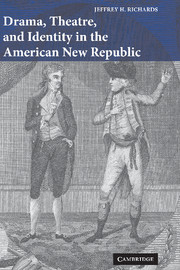Book contents
- Frontmatter
- Contents
- Acknowledgements
- Introduction
- 1 American identities and the transatlantic stage
- PART I Staging revolution at the margins of celebration
- PART II Coloring identities: race, religion, and the exotic
- PART III Theatre, culture, and reflected identity
- 11 Tales of the Philadelphia Theatre: Ormond, national performance, and supranational identity
- 12 A British or an American tar? Play, player, and spectator in Norfolk, 1797–1800
- 13 After The Contrast: Tyler, civic virtue, and the Boston stage
- Notes
- Bibliography
- Index
13 - After The Contrast: Tyler, civic virtue, and the Boston stage
Published online by Cambridge University Press: 22 September 2009
- Frontmatter
- Contents
- Acknowledgements
- Introduction
- 1 American identities and the transatlantic stage
- PART I Staging revolution at the margins of celebration
- PART II Coloring identities: race, religion, and the exotic
- PART III Theatre, culture, and reflected identity
- 11 Tales of the Philadelphia Theatre: Ormond, national performance, and supranational identity
- 12 A British or an American tar? Play, player, and spectator in Norfolk, 1797–1800
- 13 After The Contrast: Tyler, civic virtue, and the Boston stage
- Notes
- Bibliography
- Index
Summary
By 1825, theatre was well ensconced in the united States. Having spread to all major seaboard cities, it was poised to move westward, and in fact had done so in part already. Cincinnati, New Orleans, Mobile, and St. Louis were but a few of the new theatre centers that would become important stops on actors' tours in the next two decades. At the end of the century's first quarter, most of the generation of actors who had brought the stage back to the former colonies after the war had retired or died; before long, American-born actors, such as Edwin Forrest and Charlotte Cushman, would rival and ultimately supplant the British stars who would continue to seek fame and gold in the New World. The success of such plays as Woodworth's The Forest Rose made clear to managers that American-written and set material could be lucrative and that audiences would demand more in the way of American types: the stage Yankee to be sure, but also American-honed versions of British dramatic stock characters, most especially the stage African and stage Irish. Democratic energies infused what some had tried to forge as an elite-dominated entertainment medium, and as theatres got larger, holding two or three thousand patrons, spectator demographics more accurately reflected the population as a whole. If anything, 1825 would have been a good time to look back and to look forward, to see where theatre had come and where it would go.
- Type
- Chapter
- Information
- Drama, Theatre, and Identity in the American New Republic , pp. 296 - 315Publisher: Cambridge University PressPrint publication year: 2005



